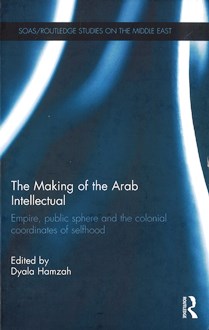The making of the Arab intellectual : empire, public sphere and the colonial coordinates of selfhood / edited by Dyala Hamzah.
Yer Numarası
A.VIII/3776
ISBN
9780415488341 (hbk)
9780203080474 (ebk)
9780203080474 (ebk)
Dil Kodu
İngilizce
Kütüphane
Türk Tarih Kurumu Kütüphanesi
Basım Bildirimi
1st published.
Yayın Bilgisi
New York ; London : Routledge, Taylor & Francis Group, ©2013.
Fiziksel Niteleme
xii, 278 s. ; 24 cm.
Dizi
SOAS/Routledge studies on the Middle East ; 18
Genel Not
İndeks s. [270]-278.
Bibliyografi, vb. Notu
Bibliyografya s. [245]-267.
İçindekiler Notu
Introduction : the making of the Arab intellectual, 1880-1960 : empire, public sphere and the colonial coordinates of selfhood / Dyala Hamzah, s. [1]-19 -- Pharaoh's revenge : translation, literary history and colonial ambivalence / Samah Selim, s. [20]-39 -- Public deliberations of the self in fin-de-siècle Egypt / Michael Gasper, s. [40]-62 -- Inscribing socialism into the nahãa : al-Muqtạtaf, al-Hilāl, and the construction of a leftist reformist worldview, 1880-1914 / Ilham Khuri-Makdisi, s. [63]-89 -- From ʻIlm to Sihafa or the politics of the public interest (maṣlaḥa) : Muḥammad Rashīd Riḍā and his journal al-Manār, 1898-1935 / Dyala Hamzah, s. [90]-127 -- Partitioned pasts : Arab Jewish intellectuals and the case of Esther Azharī Moyal, 1873-1948 / Lital Levy, s. [128]-163 -- The mahjar as literary and political territory in the first decades of the twentieth century : the example of Amīn Rīḥānī, 1876-1940 / Leyla Dakhli, s. [164]-187 -- The generation of broad expectations : nationalism, education, and autobiography in Syria and Lebanon, 1930-1958 / Christoph Schumann, s. [188]-211 -- Waiting for the superman : a new generation of Arab nationalists in 1930s Iraq / Peter Wien, s. [212]-244.
Özet, vb.
"In the wake of the Ottoman Empire’s nineteenth-century reforms, as guilds waned and new professions emerged, the scholarly ‘estate’ underwent social differentiation. Some found employment in the state’s new institutions as translators, teachers and editors, whilst others resisted civil servant status. Gradually, the scholar morphed into the public writer. Despite his fledgling status, he catered for the public interest all the more so since new professionals such as doctors, engineers and lawyers endorsed this latest social role as an integral part of their own self-image.
This dual preoccupation with self-definition and all things public is the central concern of this book. Focusing on the period after the tax-farming scholar took the bow and before the alienated intellectual prevailed on the contemporary Arab cultural scene, it situates the making of the Arab intellectual within the dysfunctional space of competing states’ interests known as the ‘Nahda’. Located between Empire and Colony, the emerging Arab public sphere was a space of over- and under-regulation, hindering accountability and upsetting allegiances.
The communities that Arab intellectuals imagined, including the Pan-Islamic, Pan-Arab and socialist sat astride many a polity and never became contained by post-colonial states. Examining a range of canonical and less canonical authors, this interdisciplinary approach to The Making of the Modern Arab Intellectual will be of interest to students and scholars of the Middle East, history, political science, comparative literature and philosophy." -- Yayıncı.
Konu
Emeği Geçenler
Hamzah, Dyala, editör.


